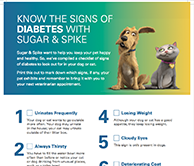Attention to Details
No one knows your dog better than you do. Diabetes can cause visible changes in your dog’s behaviour and health. It is important that your dog is thoroughly examined by a vet at least once a year. For dogs at risk, more frequent visits may be advised.
Watch the video to know more about the signs of diabetes

Signs of Canine Diabetes
Knowing the signs of diabetes is the first step in protecting your dog’s health. If any of these signs apply to your pet, bring your dog to your vet for a checkup:

Urinates frequently or large amounts

Drinks a lot of water

Always hungry

Weight loss

Cloudy eyes

Sleeps more or is less active

A Visit to Your Veterinary Practice
If your dog shows signs of diabetes, your vet will ask about them, and check your dog’s general health to rule out the possibility of other conditions or infections.
Your vet will test your dog for the presence of glucose and ketones in the urine and high levels of glucose in the blood. The diagnosis only becomes definite when glucose is found both in the urine and at a high level in the blood.
Next Article: Managing Diabetes >
Further Reading

Talk to Your Vet Today
to learn more about pet diabetes, and how cats and dogs can lead a happy,
healthy life with proper management







